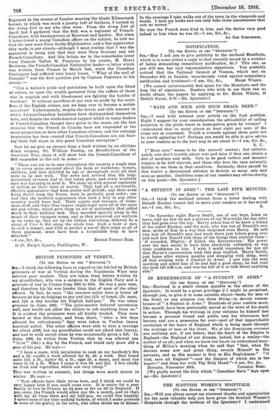BRITISH PRISONERS AT VERDUN. [To THE EDITOR OF THE "
SPECTATOR."]
Sin,—I think the following facts in regard to the life led by British prisoners of war at Verdun during the Napoleonic Wars may interest your readers. They are taken from letters written by my grandfather, who was a surgeon in the English Navy and a prisoner of war in France from 1805 to 1814. He was a poor man, and therefore his lot was harder than that of most of the other officers. In fact, he says, " the common sailor here is better off because he has no lodgings to pay and has lilb. of bread, }lb. meat, and lid, a day besides his English half-pay." He was taken prisoner in June, 1805. " The prize-master behaved uncommon well, and would not allow the sailors to rob anything from us." It is evident the prisoners were all kindly treated. They were landed at San Sebastian, and from there, " after a few days allowed for refreshment," they were taken to Verdun (many hundred miles). The other officers were able to hire a carriage for about £100, but my grandfather could not afford this luxury, and had to walk except when he was occasionally given a lift. In June, 1806, he writes from Verdun that he was allowed one " livre " (10d.) a day by the French, and would only draw 416 a year of his pay. He says:—
"I have a room, with permission to cook on my landlady's fire and a 2d. candle a week allowed for 8s. 4d. a week. Best bread costs lid. a lb., butter 6d. a lb., eggs 3d. a dozen, and meat has risen to 7d. a lb. When I came it was 2d. and 21d. I live chiefly an fruit and vegetables, which are very cheap."
This was written in summer, but things were much dearer in winter. He says :-
"Most officers have their wives here, and I think we could be eery happy here if you could come over. It is easier for a poor family to live in France, as .£4 goes as far as £6 in England. If you came, the French would allow you 10s. a month, and on that, with my £1 from them and my half-pay, we could live happily. I spend some of my time making baskets, of which I make presents to some of the gentry in the town, who often invite me to dinner.
In the evenings I take walks out of the town in the vineyards and woods. I miss my books and can only take those amusements that cost no money."
He says the French were kind to him, and the doctor very good indeed to him when he was ilL—I am, Sir, Le., As Otn SUBSCRIBER.


































 Previous page
Previous page